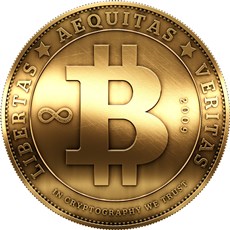The Bitcoin motto translates to “liberty, equality, truth,” but it turns out that none of those ideals are absolutely true of Bitcoins. Is the bot-money boom just like any other innovative investment boom, only worse? We think so. In fact, we predicted an implosion in the Bitcoin “market” just a few weeks ago, and it seems to be happening right now.
The bitcoin price started falling fast on Friday when Mt. Gox said it was temporarily halting withdrawals due to unexplained technical issues.
In an updated statement on Monday, Mt. Gox said withdrawals were on hold indefinitely after it “has detected unusual activity on its bitcoin wallets and performed investigations during the past weeks. This confirmed the presence of transactions which need to be examined more closely.”
The problem is not confined to Mt. Gox, however, but a vulnerability in Bitcoins themselves.
The flaw, called “transaction malleability,” is already known to some of the core Bitcoin software developers, Mt. Gox said. It allows a third party to alter the hash associated with a freshly issued transaction without invalidating its signature, resulting in two similar transactions, only one of which can ultimately be validated and included in the log of Bitcoin transactions called the blockchain.
An attacker with access to sufficient computing power could ensure that the modified transaction is included, and the original rejected. With current Bitcoin applications, it is easy to determine that the original transaction failed, but much less obvious that a modified transaction succeeded, Mt. Gox said.
“This means that an individual could request bitcoins from an exchange or wallet service, alter the resulting transaction’s hash before inclusion in the blockchain, then contact the issuing service while claiming the transaction did not proceed,” the exchange warned.
Mt. Gox had said its investigation had been triggered by “unusual activity” detected in its Bitcoin wallets.
It added that the problem is not limited to the exchange, and affects all transactions in which bitcoins are sent to a third party.
Bitcoins were supposed to herald the arrival of a techno-libertarian age, freeing humanity from the shackles of government-issued money. But virtual currencies that cannot prevent counterfeit and theft will lose value as consumers lose trust. This effect is only exacerbated by criminal notoriety. For it is not exactly true that government has no role in virtual currency markets. As of today, United States government currently controls something like two percent of the world’s Bitcoin supply through seizures of Silk Road and BitInstant. That is a big problem with virtual currencies built to escape government accountability: they naturally attract criminals, who use and obtain them criminally, inviting government intrusion into the marketplace.
No One Likes To Cash Crooked Coins
Charlie Shrem, the CEO of BitInstant, was recently arrested and charged as a secondary investigation to the Silk Road case. Shrem is accused of knowingly operating an exchange that enabled a criminal enterprise, but he was backed by respected financiers and virtual currency advocates.
The arrest of Shrem in particular will shake the core of the Bitcoin community. Shrem has been a highly visible Bitcoin entrepreneur and a vocal leader of the Bitcoin Foundation, a group that’s advocated for Bitcoin’s legality and lobbied against over-burdensome government regulation of the digital currency. Shrem’s startup, the Bitcoin payment processor BitInstant, received $1.5 million in seed funding last year in an investment round led by Bitcoin moguls Cameron and Tyler Winklevoss. “Charlie has been in the space for a very long time, and he has an impeccable reputation among Bitcoiners. He knows everyone in the space and everyone in the space knows him,” Cameron Winklevoss told TechCrunch last year. “He would be in that category of someone who lives, breathes, and sleeps Bitcoin.”
In an interview with Forbes’ Kashmir Hill last November, Shrem said that his company–and he himself–had been blacklisted from holding U.S. bank accounts. “I’ve been kicked out of every major bank in New York,” Shrem said at the time. “Chase ,Wells Fargo, Citibank, U.S. Bank. And once they shut down your business account, they ban your social security number too meaning you can’t keep a personal account.”
The Winklevoss twins (of Facebook fame) had recently endorsed Bitcoin as the “runaway winner” among virtual currencies, so they have suffered some amount of public embarrassment. This is also true of Bitcoin, because virtual currency has yet to gain acceptance in the everyday world the way Facebook has, and a criminal reputation does not help that transition happen. Bitcoins are already associated with Ponzi schemes, malware vendors, and organized crime, and not just for drugs and hit men but outright electronic theft, especially of Bitcoin wallets. One common scheme involves stealing your computing power to “mine” Bitcoins.
“Generating bitcoins is basically guessing numbers,” said Amichai Shulman, chief technology office of security firm Imperva.
“The first one to guess the right number gets 25 bitcoins and if you have a large volume of computers guessing in a co-ordinated way then you have a more efficient way of making money,” he added.
Other than a computer running slower, victims will be unaware that their machine is being used in what could become known as a “bitnet”.
It is a variation on the traditional botnet, networks of malware-infected computers used to churn out spam or bombard websites with requests in order to knock them offline.
In December, a video game company was hit with heavy fines after a “rogue engineer” inserted code into the anti-cheating software of games that turned consumer consoles into a bitnet. While the damage was limited to a few clocked chips, the incident points out that Bitcoin technology offers no guards against abusive mining. ESEA games was caught out by attentive customers, but most people will not be able to detect mining on their computers and devices. It is a transnational problem for every government. Last Summer, IT security reporter Brian Krebs reported on a bitnet with 238 “affiliates” being run out of Ukraine.
The FeodalCash administrator also claims that his affiliates are not permitted to distribute the installer file in any way that violates the law, but of course it’s unclear which national laws he might be talking about. At the same time, the affiliate program’s Web site includes a graphical tool that helps affiliates create a custom installer program that can install silently and be disguised with a variety of program icons that are similar to familiar Windows icons.
Also, the administrator demands that new users demonstrate the ability to garner hundreds to thousands of installs per day. This is a rather high install rate, and it appears many if not all affiliates are installing the mining program by bundling it with other executable programs distributed by so-called pay-per-install (PPI) programs. This was apparent because a source managed to gain administrative-level access to the back-end database for the FeodalCash program, which includes hundreds of messages between affiliates and the administrator; most of those messages are from new registrants sending the administrator screenshots of their traffic and installs statistics at various PPI affiliate programs.
One skeptic has said that because of its criminal uses, the virtual currency’s fight to achieve acceptance is as difficult as regime change.
Government control (excuse me, “public oversight”) of all major monetary transactions is one of the basic attributes of sovereignty in the modern world. If you can get away with “money laundering,” ie, circumventing this control, you can get away with anything. If you can systematically disable it, perhaps you yourself are the new regime. You’re certainly on the way.
Indeed, if we all traded in our dollars and dollar assets, and fully restandardized the global monetary system on BTC (technically a far superior design), it’s quite possible that Satoshi Nakamoto himself would simply emerge as our new global overlord. I suspect he’d be richer than the Rockefellers. How do you indict that?
That is a good question. Bitcoin has built-in political ramifications, and its libertarian purposes do not bear out in practical use. Not only are governments increasingly affecting the supply of Bitcoins through criminal seizure, the world’s biggest remaining Bitcoin wallets hardly represent an egalitarian collection of owners.
Why Billionaires Love Bitcoins
The libertarian utopia envisioned by Bitcoin advocates will probably never happen, but the “billionaire freedom movement” is very good at adapting libertarian ideals to the service of oligarchy, and Bitcoin is a good example of that phenomenon. Although awareness and acceptance of Bitcoin has grown, it is actually not a popular currency. Less than one thousand people own about half of all the Bitcoins in the world, and these people are almost all members of “the one percent.” This unequal distribution resembles the broader economy, and is likely a result of the currency’s obvious utility for billionaires who wish to avoid (1) taxes and (2) disclosure of their political influence.

Consider the earliest and most vocal champion of political Bitcoins. Dan Backer is the treasurer of many conservative PACs and a lawyer specializing in the “free speech issues” of billionaires in a Citizens United world. He created “super PACs” by suing the Federal Elections Commission, argued a case before the Supreme Court last October that may very well remove all limits on donations to federal candidates, and led efforts to exempt tea party groups from disclosure requirements.
Last year, he asked the FEC to consider officially approving Bitcoin donations and wrote a nice op-ed at POLITICO to encourage public pressure for adoption. The draft plan was popular with Bitcoin advocates, most of all Backer, but worries about anonymous campaign donations contributed to a deadlocked panel. Mr. Backer thinks that further draft regulations will resolve those worries, but he offers no specific ways to ensure compliance. Forging ahead, Backer has launched a Bitcoin PAC that aims to “raise funds in Bitcoin to make campaign contributions to select, bi-partisan leaders in the House & Senate. We can ensure that decisions about Bitcoin are made by those who’ve benefited from Bitcoin.” In other words, politicians who get lots of money through virtual currencies will not damage their value with pesky regulations.

Steve Stockman has financial accountability issues. His very sloppy reporting habits have gotten him in trouble with regulators, and he runs a very sketchy nonprofit organization. But his long-shot primary campaign against Senator John Cornyn features a Bitcoin wallet for donations and boasts Dan Backer as campaign treasurer, so it is fair to call him the very first Bitcoin candidate. Stockman is very enthusiastic about virtual currency as a check on the power of the Federal Reserve. If that sounds like something Ron Paul would say about getting back on the gold standard, it is no accident: Dan Backer was the treasurer of Paul’s Revolution PAC, and Stockman hopes to tap the same vein of young, libertarian activist money and energy that Ron Paul did. He is certainly trying to make his name synonymous with Bitcoin politics.
Stockman is the only entry on the “candidates” page at CoinPAC, which presents itself as a political action committee for virtual currency. The coordinator of CoinPAC is Sean McGovern, a Dan Backer client who specializes in public administration. McGovern’s posts at Bitcointalk.org could have been written by the Koch brothers: he is against the minimum wage and regulations, for example, but enthusiastic about the “well-deserved success” of Sam Walton’s heirs. His nearest Bitcoin meetup group includes at least one virtual currency entrepreneur, and his proximity to the Chicago mercantile exchange suggests that he is close to the bleeding edge of this new market.
So rather than a regime change, virtual currencies seem poised to exacerbate the current inequitable balance of power in America’s government and economy by further empowering the wealthiest Americans at a cost to the middle class. An interested group of highly-connected advocates is ready to make that happen, and billionaires are holding Bitcoin wallets in expectation of many Steve Stockmans to come, all promising a smaller government with less regulation and taxation. Their libertarian utopia will look exactly like the one we have now, only worse.

